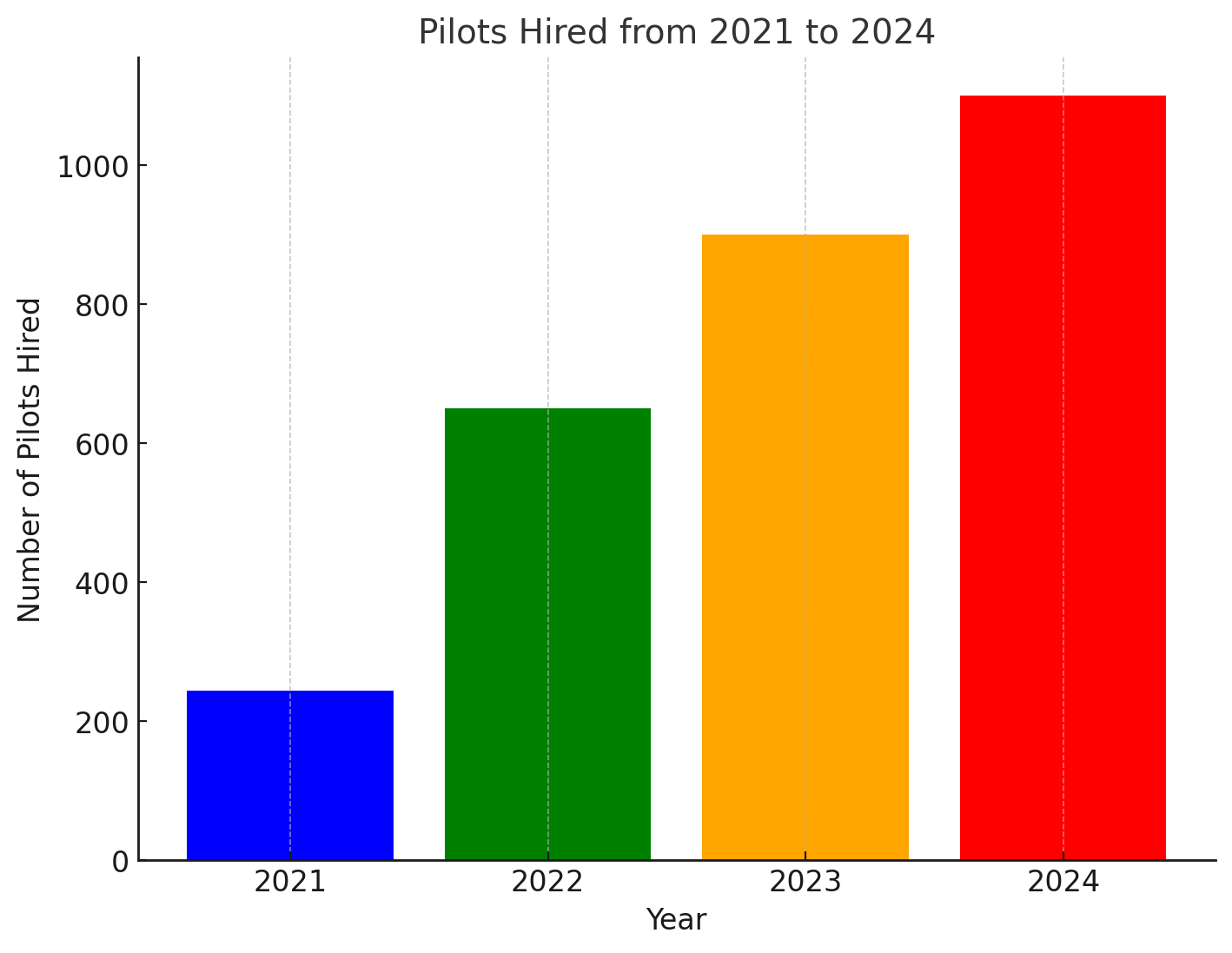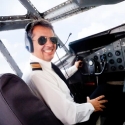Top Aviation Courses After 12th: Unlocking High-Flying Careers in India's Booming Aviation Industry
Why pursue aviation courses after 12th?
Joining aviation courses after completing 12th in India can be an exciting and rewarding decision for several reasons. Here’s why you should consider it:
India is one of the fastest-growing aviation markets globally and it is the 3rd largest aviation industry in the world, with significant increases in both domestic and international travel. With new airports being developed and airlines expanding their fleets, the demand for aviation professionals is rising.
According to the Directorate General of Civil Aviation (DGCA), India's aviation industry is projected to be the third-largest in the world by 2025.
In 2014, India had 74 operational airports. By 2024, this number has grown significantly to around 157 airports. The expansion of the aviation infrastructure is set to continue, with the number of airports expected to reach approximately 400 by the year 2047. This growth reflects the country's emphasis on enhancing connectivity and boosting the aviation sector as part of its long-term economic plans..png)
datasource: pib.gov.in
The graph above illustrates the significant increase in domestic passenger count in India, rising from 60 million in 2014 to 150 million in 2023. This growth reflects the rapid expansion of the aviation sector in the country over the past decade.
What are the available aviation courses after completing 12th?
With such rapid growth expected in the country, it's no wonder that the hospitality and travel sectors are also experiencing a surge in demand for skilled professionals. There are several aviation courses available, with a 3-month program designed specifically for degree holders, providing them with a fast-track learning option. For students who have completed their 12th grade (+2), a more comprehensive 1-year diploma course is available, offering in-depth training to prepare them for various roles in the aviation industry.
List of aviation courses that can be completed in 11-12 months after completing 12th?
Cabin Crew/Air Hostess
Cabin crew training is a comprehensive program that equips aspiring air hostesses and flight attendants with the necessary skills to ensure the safety and comfort of passengers. The curriculum covers various aspects, starting with Aviation Familiarization, where students are introduced to the airline industry, aircraft types, and basic airline operations.
A key focus is the Cabin Crew Lifestyle, which includes understanding the unique work-life balance, handling long hours, and maintaining a professional demeanor during flights. Grooming Training plays a crucial role in this, as cabin crew are expected to maintain high grooming standards, reflecting the airline's image. This involves learning about personal appearance, uniform standards, and professional etiquette.
The course also covers essential health and safety topics like Basic First Aid and Safety and Emergency Procedures, which are critical for dealing with medical emergencies or evacuations during flights. In-depth training on In-flight Services and Announcements prepares students for managing passenger needs, serving food and beverages, and making important in-flight communications.
Students are also trained in Airline Service & Maintenance, focusing on customer service excellence, and Airport & Aircraft Safety/Security, which teaches them to ensure passengers’ and crew’s safety. The syllabus further includes Airport Access-Airside and Terminal Operations and Airport Housekeeping, providing insight into the behind-the-scenes work that keeps airports functioning smoothly.
To prepare for their careers, students receive Interview Preparation and Soft Skills training, focusing on Communication and Interview Skills to help them excel during recruitment processes. This comprehensive curriculum ensures students are fully prepared to succeed in the aviation industry.
- Qualification: Minimum +2 or Graduate
- Height: Min. Ht.157 Cm for Females and 170 Cm for Males.
- Age: 18-25 Years
Airport Ground Staff
The Airport Ground Staff training program is designed to prepare students for a variety of roles within the airport operations sector. The curriculum covers all key areas required to efficiently manage airport services and ensure passenger satisfaction.
One of the core modules is Airport Service & Aircraft Security, where trainees learn about safeguarding both aircraft and passengers, ensuring compliance with aviation security protocols. In Ground Control & Baggage Handling, students are trained to manage the flow of aircraft on the ground and oversee the safe handling and transportation of baggage.
Airport Housekeeping is another critical aspect, teaching students the importance of maintaining cleanliness and order within the airport terminal, contributing to a smooth passenger experience. The training also covers Ramp Functions, which involves managing the logistics of loading and unloading aircraft, fueling, and coordinating ground equipment.
The course includes essential Aviation Admin Operations, focusing on the administrative tasks that support airport management, and Global Distribution Systems (GDS), which are used for booking flights, hotel reservations, and managing travel logistics. Airfares Calculations introduces students to fare structuring and ticket pricing, crucial for roles in ticketing and reservations.
Additionally, soft skills development is an integral part of the program. Interview Preparation, Communication Training, and Soft Skills & Personality Training equip students with the ability to perform well during recruitment processes. Finally, Grooming Training ensures students maintain the professional appearance and behavior expected in the aviation industry, reflecting the high standards of airport operations.
This comprehensive training ensures that aspiring airport ground staff are fully prepared to handle the demands of a career in airport operations.
- Qualification: Minimum +2 or Graduate
- Age: 18-25 Years
Flight Dispatcher
The Flight Dispatcher course is designed to provide essential knowledge and skills to individuals responsible for planning and monitoring flights. A flight dispatcher plays a critical role in ensuring the safety, efficiency, and smooth operation of airline flights. They work closely with pilots and airline staff to plan flight routes, monitor weather conditions, and ensure regulatory compliance.
Key components of the flight dispatcher syllabus include Air Law and Air Traffic Control, where students learn about aviation regulations, safety standards, and how air traffic is managed.
Principles of Flight and Aircraft Systems and Engines are essential topics, providing an understanding of how aircraft operate and the mechanical systems involved in flight.
Mass and Balance teaches flight dispatchers how to calculate the weight distribution of an aircraft, which affects its stability and performance. The Performance section focuses on optimizing the aircraft's capabilities during different flight phases. Navigation covers the tools and techniques used to guide aircraft safely from one location to another.
A strong emphasis is placed on Meteorology, enabling dispatchers to interpret weather patterns that could impact flight safety, and Flight Planning and Flight Monitoring, where they learn to develop optimal flight plans, monitor progress, and adjust for any unforeseen changes.
Operational Procedures ensures compliance with airline and government regulations, while Human Performance (Physiology and Psychology) emphasizes the human factors that influence the performance of flight crews and dispatchers, helping to minimize errors caused by stress or fatigue.
Overall, flight dispatchers play a crucial role in coordinating and overseeing flight operations, ensuring safe, timely, and efficient air travel.
- Qualification: Minimum +2 or Graduate
- Age: 18-25 Years
List of aviation courses that take 2 to 3 years after completing 12th?
Pilot Training
Pilot training is an intensive program that equips aspiring pilots with the skills and knowledge necessary to safely operate an aircraft. The syllabus covers key areas of aviation science and technology to ensure comprehensive training. Aviation Meteorology provides an understanding of weather patterns and atmospheric conditions, which is crucial for making informed decisions during flights. Air Navigation focuses on navigation systems, radio navigation, flight instruments, flight planning, aircraft performance, and mass and balance calculations, all of which are essential for safely guiding an aircraft from takeoff to landing
datasource: pig.gov.in
The Air Regulation module ensures students are well-versed in air law, operational procedures, and human performance, covering both physiological and psychological aspects. This knowledge is critical to ensuring compliance with aviation standards and addressing challenges in real-time. Technical General introduces future pilots to the fundamentals of aerodynamics, aircraft engines, and systems, along with avionics, enabling them to understand the technical aspects of their aircraft.
Simulator training, which includes Cockpit Layout, Effects of Controls, and Stall Recovery, gives students practical experience in handling an aircraft in various scenarios. Pilots are trained to respond to emergencies, ensure passenger safety, and make critical decisions during flights.
As for the roles and responsibilities, a pilot’s primary job is to operate aircraft while ensuring the safety of passengers, crew, and cargo. They follow strict flight plans, coordinate with air traffic control, manage in-flight systems, and handle emergency situations. Pilots must maintain precise navigation, monitor weather conditions, and ensure smooth takeoffs and landings, all while adhering to aviation laws and regulations.
- Eligibility: Minimum +2 (With Physics, Chemistry & Mathematics)
- Age: Minimum 17 years
B.Sc in Aviation
The B.Sc. in Aviation is a comprehensive undergraduate program designed to equip students with both theoretical and practical knowledge related to the aviation industry. The syllabus covers a wide range of subjects crucial for building a strong foundation in aviation science and operations. English and Communication Skill Practical courses enhance students' communication abilities, essential for interacting in a globalized aviation environment.
Indian Heritage and Culture and Environmental Science provide a well-rounded education by introducing students to cultural studies and sustainability, which are increasingly important in modern aviation. Courses like Aviation Mathematics, Aviation Physics, and Aviation Science focus on the technical aspects of flight operations, such as aerodynamics, aircraft performance, and the physical laws governing flight.
Aircraft Awareness and Basics of Simulator give students hands-on experience with aircraft systems and simulators, preparing them for real-world flying scenarios. Air Navigation and Regulation educates students on air traffic rules and flight planning, ensuring compliance with international aviation laws. The Aircraft Ground Handling and Safety module is critical for understanding ground operations, which ensures efficient aircraft turnaround and safety protocols.
Upon completing a B.Sc. in Aviation, graduates have multiple career opportunities. They can pursue roles as Pilots, guiding aircraft safely across various airspaces. Other career options include Cargo Managers, responsible for logistics and air freight, and Service Maintenance Engineers, who ensure aircraft are airworthy. Graduates may also become Flight Test Engineers, specializing in testing aircraft performance and safety, making this degree a gateway to a diverse range of aviation careers.
BBA Aviation
The BBA in Aviation is a specialized undergraduate program aimed at developing managerial skills with a focus on the aviation industry. The curriculum integrates core business concepts with aviation-specific studies, preparing students for leadership roles in the fast-growing aviation sector.
The course on Management Process provides students with a deep understanding of organizational structures, decision-making, and management strategies essential for running aviation businesses efficiently. Financial Accounting equips students with the ability to manage financial operations, interpret financial data, and contribute to the financial health of aviation organizations. Mathematics for Management sharpens analytical skills, which are critical for problem-solving and decision-making in various aviation management scenarios.
Environmental Studies ensures that students are aware of the environmental impacts of aviation and helps them understand sustainability practices that are becoming increasingly important in the industry. Additionally, the program places emphasis on Leadership Qualities, helping students develop essential skills for managing teams, projects, and operations within the highly regulated aviation environment.
Graduates of BBA in Aviation can pursue a variety of career paths. As an Air Traffic Manager, one can oversee the safe and efficient movement of aircraft in controlled airspace. Aviation Planners are responsible for route planning, scheduling, and managing airport operations. Resource Managers ensure that aviation resources, such as personnel and equipment, are utilized effectively. Financial Analysts work on budgeting and financial forecasting for aviation companies, while Senior Staff Analysts provide high-level support in policy development, strategy planning, and operational efficiency. This degree provides a solid foundation for diverse roles within the aviation industry.
- Eligibility: Minimum +2 (Any stream)
- Age: Minimum 17 years
Conclusion
In conclusion, pursuing aviation courses after completing 12th offers a gateway to a dynamic and fast-growing industry. With India's aviation sector expanding rapidly, the demand for skilled professionals in various roles such as cabin crew, airport ground staff, flight dispatchers, and pilots is on the rise. These courses provide students with the technical knowledge, practical training, and soft skills required to thrive in the competitive aviation environment. Whether you're aiming to fly planes, ensure smooth airport operations, or work in management, the aviation industry offers diverse and rewarding career opportunities. As the number of airports and passenger traffic increases in India, the potential for long-term career growth in this sector is immense. By choosing the right aviation course after 12th, students can embark on an exciting career with excellent prospects, contributing to India's status as a global aviation hub.











Post a Comment